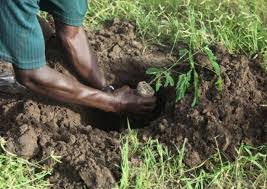Nebeday
Sustainable supply

![]() SÉNÉGAL
SÉNÉGAL
Web: www.nebeday.org/
Contact: info@nebeday.org
Location: Toubakouta, Sénégal
Sector: Agriculture
Project creation: launched in 2011
Analysis by the association: November 2016
Agro-forestry and reforestation in Senegal.
overview
Nebeday is a Senegalese association born in 2011 under the impetus of Jean Goepp. It works mainly in the Toubakouta region of Senegal, and its goal is to reduce deforestation and enable local communities to develop sustainable agriculture that is sufficient to meet their needs.
The first operation launched by Nebeday was a forest replanting operation entitled “100,000 trees”. Its ambitious goal has been largely achieved. This is why the operation was followed by operations “200 000 trees” and “300 000 trees”.
- 300 000 trees planted
- 32 villages involved
- 4 beneficiary communities
- Sustainable supply
- Recycling
presentation of the circular economic approach
To achieve these objectives, three levers of action are implemented:
On the one hand, vast reforestation campaigns are conducted in schools or around forests: 300,000 trees have been planted to date. These plantations make it possible to reduce bush fires, which are devastating for the forest.
In parallel, the association promotes the use of a bio-coal made from burnt straws in order to provide an effective alternative to wood. market gardening in agro-forestry are developed with the aim of achieving food self-sufficiency.
Nebeday favors the planting of Moringa in these plots. This robust tree combines fast growth with a high content of nutrients, vitamins and minerals, making it a very interesting dietary supplement. This is why he is nicknamed the “never die”, or “Nebeday”.
The three components of the Nebeday activity each contribute to the goal of sustainable development of the association.
Reforestation, in the first place, constitutes a carbon sink. It prevents bush fires and helps maintain the forest.
In addition, trees are planted in public places, such as schools, which favors wetter micro-climates during dry seasons. This aspect is further increased by the production of bio-coal: straw is mown in the bush – further reducing the risk of fires – then burned in a controlled way, in order to enter the composition of bio-coal. Its high energy content makes it a lightweight fuel and decreases firewood cutting, while reducing the time spent on supply.Finally, market gardening plots are an example of sustainable supply.
The climate of Toubacouta region allows agriculture only three months in the year. Agro-forestry, coupled with a subtle arrangement of water networks around the wells allows for market gardening for the other nine months, and reduce the dependence of the inhabitants of the region on imported products.
sustainable approach
The environmental contribution of Nébéday is multiple:
- Reforestation
- Accumulation of carbon
- Creation of micro-climates
- Diminishing bushfires
- Preservation of a fragile forest ecosystem …
If reforestation actions are carried out on a voluntary basis, the establishment of market gardening and the production of bio-coal have the double advantage of reducing the regional dependence on external products and creating many local jobs.
The Nebeday projects bring more social cohesion by involving many members of the region in reforestation.
Moreover, the creation of jobs improves the condition of the beneficiaries. As far as market gardening is concerned, they are women, which contributes to improving the status of women.
Finally, the entire population is aware of the issues of environmental preservation and sustainable development.
replicability & future perspectives
The action of Nebeday seems reproducible in many areas subject to the problem of scarcity of wood fuel resources, and too much seasonality of agricultural production.
It should be noted however that the presence of Jean Goepp was of paramount importance in the launch of the project: in addition to having initiated it, he managed to give it a strong impetus to start.
